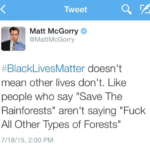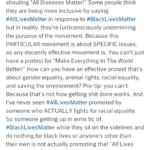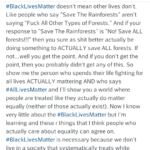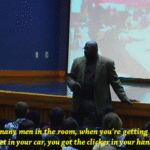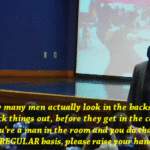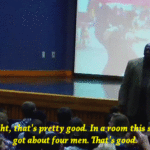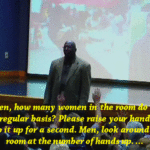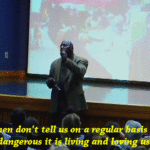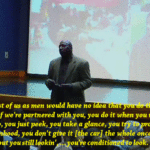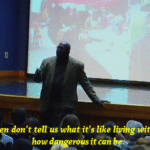allyship
How Can You Use Your Privilege To Help Others?
StandardThere are a number of ways. Check out our posts below and tell us what you’re doing to use your privilege for good by sending us an ask or reblogging with your comments.
5 Ways To Use Your White Privilege To Help Others
5 Ways To Use Your Cisgender Privilege To Help Others
5 Ways To Use Your Male Privilege To Help Others
Allies Are Still Privileged; Don’t Forget It
StandardBeware the privileged repackaging the words/experiences of the oppressed and being applauded for it while the oppressed are ignored, silenced or punished for speaking their lived truths. Further, those who only want to hear the messages of the oppressed from the privileged and call said action “progressive” are actually complicit in either facilitating the oppression of others (if they themselves are privileged) or have internalized the oppressors’ tactics (if they themselves are oppressed and still prefer the messages of the oppressed in a privileged mouthpiece, as if the privileged have to provide “credibility” to the message of the oppressed before it matters).
If this applies to you, question why White anti-racism advocates, male feminists, cis, heterosexual, or cishet allies to LGBTQIA people, rich people “playing poor” for a week or so on food stamps or low pay and thin allies to fat activists "move" you more than the oppressed people themselves.
This is not about allies not having a place and being important. They do and are. If you can’t see how allies are important BUT also cannot dominate the discourse or portray the oppressed as monolithic groups with monolithic thoughts, it’s time to re-evaluate your own praxis.
With any discussion of oppression, if your go-to voice is a cis, heterosexual, able-bodied, middle class White male to the point that you are willing to defend him against the actual oppressed people, you need to re-evaluate your theory and praxis. You need to re-examine the role of an ally. The role–not the goddamn pulpit, publishing house, bookshelf, classroom, board of directors, pundit TV spot etc. where the privileged thrive.
You need to question your privilege even as an ally, especially as an ally if that same privilege continues to allow your voice to be centered above those you claim to help, especially when you are making a living, financially profiting off of the oppression of other people by talking about the oppression of other people.
Most of all, stop expecting to be applauded all the damn time. Ally work can be noble when not self-centered, domineering and solely a salve for personal guilt, but no more noble than those in the trenches doing the work and living the experiences. Ally work needs to be noble without the incessant need for the praise of its nobility, otherwise it becomes about oppressed people applauding their oppressors, which is not revolutionary.
10 Simple Ways White People Can Step Up to Fight Everyday Racism
Link10 Simple Ways White People Can Step Up to Fight Everyday Racism
By Derrick Clifton | September 4, 2014 | Mic.com
Let’s face it: Most white people don’t like being accused of racism or hearing that they have white privilege.
For many whites, these types of accusations have nasty connotations, hearkening back to slavery, colonialism, rape, genocide, segregation and disenfranchisement. But although it may be uncomfortable, these connotations can’t be swept under the rug. Learning about the history of racial oppression in America is an important step toward understanding why many people of color have a hard time trusting white people.
For multiple generations, people of color have had negative experiences encountering institutional racism and microaggressions, so it is no surprise that they may prefer not to deal with whites altogether.
This isn’t to say that all white people are racists, or even that all white people have direct culpability in creating or sustaining racism in America. Indeed, being pushed away by people of color or being called-out on racism — directly or indirectly — may instead inspire feelings of resignation or hurt. And some whites truly wish to help as best as they can while cultivating strong relationships with people of color.
Unfortunately, there isn’t extensive education in American classrooms that examines racism throughout history. As a result, there are not nearly enough opportunities for whites to learn how they can bridge gaps of misunderstanding, distrust and guilt towards achieving true equity and inclusion for people of color. For too long, whites have only heard about racism in the context of what not to do, but rarely, if ever, do white people hear about how they can be proactive about the issue.
By taking the leadership of people of color in the broader conversation about eradicating racism, whites can take steady, even simple steps towards becoming allies in the fight against racial inequality, not merely bystanders — or worse, perpetrators:
1. Listen when people of color talk about everyday racism and white privilege.
When a white person speaks up about racism, other whites tend to listen carefully and respectfully, even if they disagree. But more often than not, when blacks and people of color speak about racism, the instinct is to jump to conclusions, to interrupt, call them liars, question their intelligence or walk away from the conversation altogether.
Ending such a dialogue because one might feel uncomfortable does little to push the conversation forward, and reinforces white privilege. People of color live with the burden of institutional racism, but there are little-to-no consequences for whites who choose to ignore a historically violent and oppressive system from which they benefit every day.
Instead, a more productive solution comes through listening carefully and reserving judgment when people of color openly discuss the pain they have endured.
2. Honor the feelings of people of color in the discussion. It is not about your white guilt.
If white people are tired of hearing people of color “whine” or “rant” about white privilege, then imagine how exhausting and burdensome it is to directly contend with racism every day for years.
The last thing people of color need to hear from white people is how they should deal with or talk about encountering racism. Even with the most well-intentioned effort, white people must acknowledge they will never have the same understanding or range of experiences that people of color bring to the conversation. This is not to say that white people can’t join the discussion, but that they must focus on a solution.
Too often, white people overreact to criticism, become defensive and turn their feeling of uncomfortableness back on their peers. People of color have long been policed for their “tone” or “overemotional attitude,” feelings that are human and valid after dealing with something as infuriating as racism.
3. Ask plenty of questions. Earnestly seek to understand people of color before trying to have your viewpoint understood.
During a heart-to-heart about racism, don’t assume that everything being said immediately makes sense. The best way to seek clarity and bridge any gaps of knowledge is to simply ask for more information, just as you would for any other topic that isn’t your area of expertise.
It’s OK to admit that you don’t know how it feels to be racially profiled by cops, surrounded by advertisements that reinforce Eurocentric beauty standards or be presumed unintelligent or inferior until proven otherwise — all because of the color of your skin. By being inquisitive, you’re more likely to reach a place of understanding and empathy. Once this connection is established, you have a stronger foundation to share your own personal experiences.
4. Educate yourself about racism as much as possible before asking people of color for help.
It’s important to listen and defer to people of color during discussions about racism, but remember that they, too, are humans with limits on their time, resources, attention spans and emotional reserves. Sometimes, they may not have the energy to educate white people about racism because they’ve talked about it so much already. It may also trigger pain, resentment and sadness from dealing with oppression.
So if a person of color backs away from the conversation and asks for space, respect that. There is no lack of information on the topic. Take responsibility and educate yourself, using the many books, recorded speeches, poems, news articles, research studies and other sources of information publicly available.
5. Challenge other white people in your life to think critically about racism — family, friends, coworkers, teachers and even public officials.
If you see or hear something, say something. Don’t ignore discussions of racism when they emerge in the news cycle or sit by idly while someone perpetuates racial stereotypes or blatant disrespect — even if that disrespect is coming from a close friend, family member or superior. Encourage white people in your life to engage in the same kind of critical thinking that you yourself are engaging in.
6. Direct peers towards the perspectives of people of color. Becoming a “savior” is not cool.
It’s crucial not to hog all of the air in the conversation, or act as the spokesperson for people of color — because white people can’t truly present the perspectives of people of color. In addition, white perspectives and voices have historically been given priority over the lived experiences and knowledge produced by people of color.
Instead, actively affirm the leadership of people of color in the conversation. Consider limiting the amount of personal perspective you offer and refer other white people to the same sources of enlightenment and insight that helped you best understand how to put anti-racism into practice.
7. Avoid conflating other oppressions with racism unless it’s directly relevant to the conversation.
In an often well-intentioned, yet half-hearted way of empathizing or identifying with someone else’s struggle with racism, it’s easy to say “I know what that’s like” because I’m gay, or a woman, or poor, or disabled or a religious minority. These other identities may intersect with racial inequality, but are not about race. Yes, experiencing another form of oppression should help you empathize, but that doesn’t mean that you’ll ever really know what racism feels like.
Instead, it can come off as insulting, or make it seem like you’d rather shift the discussion toward a subject you feel more comfortable talking about. Even worse, this type of conversational pivot can imply that your differing oppression takes priority, something that strains the potential bond that could be formed in the conversation.
8. If you make a mistake, ask people of color how you can fix it.
It’s good to admit you’ve done wrong and own up to your mistakes — it’s a much more positive and effective reaction to backlash than dismissing racism critiques or denying there’s a problem. As with any other situation that reveals a personal fault line, ask how you can behave better in the future and show that you genuinely care about ensuring that people of color are truly welcomed, affirmed and respected.
Keep in mind that as a person who has power and privilege in the situation, you have a responsibility to ensure others aren’t being continually impacted by oppression, especially if it comes from you.
9. Adopt intersectionality as an approach to all aspects of everyday life and start taking it seriously.
Intersectionality is much more than just an abstract academic theory developed by feminist scholars like Kimberlé Crenshaw and writers and advocates of color. Indeed, it’s a liberating way of living, working and even connecting with other people.
Intersectionality matters because it acknowledges that there are multiple perspectives that need to be honored and understood on any given issue — big or small — because each individual experiences a variety of privileges and limitations based on their identities. For example, a person can experience prejudice because they aren’t heterosexual and because they aren’t wealthy, but still can exercise their racial privilege as a white person. All of those identities coexist.
For the individual above, the experience of being white, gay and poor will differ from someone who shares the same set of identities, but is instead a person of color. Intersectionality teaches us that race impacts the amount of difficulty or relative ease two individuals of different racial backgrounds will experience, while navigating an otherwise similar set of institutional challenges.
10. Openly call out and reject any and all white privilege you witness or experience.
Yes, this means giving up your privilege in order to level the playing field.
This could mean speaking up when a cab zooms past a black woman and picks up you and your white friends instead, a phenomenon known as destination discrimination. Or it could mean objecting when asked to speak about racism in lieu of a person of color who is more qualified, or after witnessing a person of color receive harsher punishment for something that earned you a mere slap on the wrist.
Reject and name that privilege — because you didn’t earn it and it’s not one you chose. Recognize it for what it truly is: a perpetuation of some of the worst, lingering elements of racism and white supremacy.
To the many white people who have asked us what they can do to stand up against everyday racism – here…start with these 10 things.
THIS IS EVERYTHING.
Dear Woke White People,
StandardIf you really care then don’t be afraid to check your people.
You could really be saving a life.
Got you
This is the most important thing. Don’t run around talking about “I’m not racist” and “I’m an ally” …….but then stay silent and unmoving when your fellow whites start spewing hate.
ESPECIALLY if it’s “just a joke”. That shit ain’t cute, and you ain’t slick.
It physically pains me to see people (especially women) attacking men for identifying as feminists. Like second hand embarrassment for real. Just remember that there are always other feminists of all genders who are glad to hear you! 😙
StandardI will NEVER EVER get mad when a woman doesn’t trust me or my motives in the feminist space. Men have created the conditions that make women feel like they cant even walk outside let alone trust a man. I don’t blame them at all. I’d be skeptical too. I know how they think i may be isn’t who i am. And i take that. My job isn’t to look cool or be loved. Just support those fighting the good fight. I don’t get upset with women who say men can’t be feminists, because men made feminism necessary. My hurt feelings will heal. Its nothing compared to centuries of womens’ oppression
NOTHING MAKES ME ANGRIER THAN SOCIALIZED MALE DOMINANCE IN CONVERSATIONS SO LADIES PLEASE LEARN THESE THREE PHRASES AND NEVER BE AFRAID TO USE THEM
- “Stop interrupting me.”
- “I just said that.”
- “DID THE MIDDLE OF MY SENTENCE INTERRUPT THE BEGINNING OF YOURS?”
ALSO WHEN YOU SEE FEMALES IN YOUR LIFE BEING DISMISSED IN CONVERSATION:
- [Name] was speaking, how about we let her finish?
- [Name] just said that.
- [Name] was in the middle of saying something, can you please let her finish?
every fucking day I do this for myself and other women its a constant struggle to be heard
exgynocraticgrrl-archive-deacti:
Tony Porter: A Call To Men
"Tony is the original visionary and co-founder behind A CALL TO MEN: The National Association of Men and Women Committed to Ending Violence Against Women. He is the author of "Well Meaning Men...Breaking Out of the Man Box - Ending Violence Against Women" and the visionary for the book, NFL Dads Dedicated to Daughters.
Tony's message of accountability is welcome and supported by many grassroots and established organizations. He’s currently working with numerous domestic and sexual violence programs, the National Football League, the National Basketball Association, colleges and universities around the country. He has worked with the United States Military Academy at West Point and the United States Naval Academy at Annapolis.
Tony is an international lecturer for the U.S. State Department having worked in the Democratic Republic of the Congo, United Kingdom and Brazil. In addition, he has been a guest presenter for the United Nations' Commission on the Status of Women and has been a script consultant for Law & Order: Special Victims Unit." - (x)this is so important.


